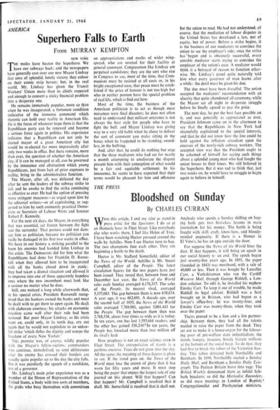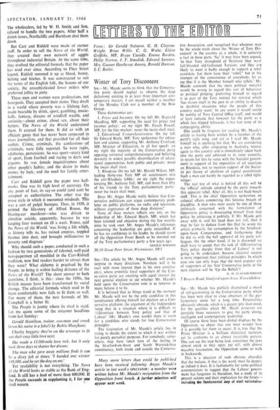THE PRESS
Bloodshed on Sunday
By CHARLES CURRAN
WITH this article, I end my stint as stand-in press critic for the Spectator. I do so at an Homeric hour in Fleet Street. Like everybody else who works there, I feel like Helen of 'Troy. I have been watching Hector pursued around the walls by Achilles. Now I see Hector turn to bay. The two champions face each other. They are beginning a battle to the death.
Hector is Mr. Stafford Somerfield, editor of the News of the World. Achilles is Mr. Stuart Campbell, editor of the People. The latest circulation figures for the two papers have just been issued. They reveal that, between June and December last year, the News of the World sales each Sunday averaged 6,176,317. The sales of the People, its nearest rival, averaged 5,537,683. The gap between them is now 638,634. A year ago, it was 662,691. A decade ago, over the second half of 1955, the News of the World sales averaged 7,769,981, against 5,001,443 for the People. The gap between them then was 2,768,538, about four times as wide as it is today. In ten years, one has lost 1,593,664 readers, and the other has gained 536,240.'In ten years, the People has knocked more than two million off its rival's lead.
Now prophecy is not an exact science, evea in Fleet Street. The extrapolation of trends is a perilous exercise. Trees do not grow into the sky. All the same, the meaning of those figures is plain to see. If the trend goes on, the News of the World must lose the crown of glory that it has worn for fifty years and more. It must stop being the paper that enjoys the largest sale of any journal 'on this planet. Will that happen? Can that happen? Mr. Campbell is resolved that it shall. Mr. Somerfield is resolved that it shall not. Anybody who spends a Sunday shilling oh buy- ing both gets two first-class lessons in mass journalism for his money. The battle is being fought with skill, craft, know-how, and bloody minded pugnacity. If there is a Homer in El Vino's, he has an epic outside the door.
For suppose the News of the World bites the dust. If that happens, it will bring an epoch in our social history to an end. The epoch began just seventy-five years ago. In 1891, the paper (founded in 1843) was moribund, with a sale of 40,000 or less. Then it was bought by Lascelles Carr, a Yorkshireman who ran the Cardiff Western Mail, through George Riddell, a Lon- don solicitor. To edit it, he installed his nephew Emsley Carr. To keep it out of trouble, he made. Riddell its legal adviser. Riddell was a Scot brought up in Brixton, who had begun as ,a lawyer's office-boy; he was twenty-four, and Emsley Carr was twenty-three, when they took over the paper.
Theirs proved to be a lion and a fox partner- ship. Between them, they had all the talents needed to raise the paper from the dead. They set out to make it a house-organ for the labour- ing poor of pre-welfare state industrialism; the dumb, hungry, insecure, barely literate millions at the bottom of the social heap. To do that, they had first to break the taboo of the Victorian Sun- day. This taboo defeated both Northcliffe and Burnham. In 1899, Northcliffe started a Sunday Daily Mail, and Burnham a Sunday Daily Tele- graph. The Puritan Britain burst into rage. The Biitish Weekly denounced them as infidel Sab- bath breakers; so did the Methodist Recorder;. so did mass meetings in London of Baptist;". Congregationalist and Presbyterian ministers.
The wholesalers, led by W. H. Smith and Son, refused to handle the two papers. After half a dozen issues, Northcliffe and Burnham shut them down.
But Carr and Riddell were made of sterner stuff. In order to sell the News of the World, they created their own network of agents throughout industrial Britain. At the same time, they evolved the editorial formula that the paper has used ever since. According to Fleet Street legend, Riddell summed it up as blood, booze, betting and bitches. It was constructed to suit the tastes of the English folk, the Saxons of our society, the unsophisticated lower orders who preferred jollity to piety.
These men and women were proletarians, not bourgeois. They accepted their status. They dwelt in a world where poverty was a lifelong fact, made bearable by drink, sport, gambling, music- halls, fantasy, dreams of windfall wealth, and curiosity—about crime, about sex, about their betters. The News of the World understood them. It catered for them. It did so with an efficient gusto that has never been surpassed in mass journalism, and that provided for all their outlets. Crime, criminals, the confessions - of criminals, were fully reported. So were rapes, adulteries, perversions. So was sport—every kind of sport, from football and racing to darts and pigeons. So was female inquisitiveness about other people's habits; and the desire to make money by luck; and the need for family enter- tainment.
Carr and Riddell gave the paper two hall- marks. One was its high level of accuracy. On any point of fact, its say-so could (and can) be accepted as authoritative. The other was the prose style in which it recounted misdeeds. This was a sort of pulpit baroque. Thus, in 1930, it printed the life-story of Alfred Rouse, the blazing-car murderer—who was driven to simulate suicide, apparently, because he was keeping four women on £8 a week. Rouse, said the News of the World, 'was living a life which, as history tells us, has ruined empires, toppled thrones into dust, and brought millionaires to poverty and disgrace.'
Why should such a paper, conducted in such a fashion by two generations of talented, well-paid newspapermen all moulded in the Carr-Riddell
tradition, now find readers harder to attract than they were? What alchemy is practised by the People, to bring it within hailing distance of the News of the World? The short answer to both. questions, I think, is this : since the 1890s, the
British masses have been transformed by social change. The editorial formula which used to fit them comfortably now fails to fit them so well. For many of them, the new formula of Mr. Campbell is a better fit.
The People is jaunty where its rival is staid. Let me quote some of the streamer headlines from last Sunday:
Gerald Hamilton, traitor, con-man and crook (even his name is a fake!) by Robin Maugham; Cheeky beggars; they're on the scrounge to fit out their cosy little love nest; She made a 13,000-mile love trek, but it only took three days to shatter her dream; The man who gave away millions finds it can he a dicey job at times; '1 handed one winner 148,000, and he set the dog on me.'
Yet readability is not everything. The News of the World looks as stable as the Bank of Eng- land. It still has a lead of more than 600,000. If the People -succeeds in- supplanting it, I for one shall mourn.



































 Previous page
Previous page